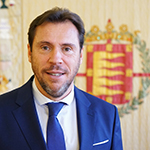Valladolid, Spain - Intercultural city

Valladolid is located in the northern half of the Iberian Peninsula's Meseta Central, at the confluence of the Pisuerga and Esgueva rivers, surrounded by winegrowing areas. The city has had a rich history since its foundation in the 11th century. Today, it is the primary seat of government of the autonomous community of Castilla y León and it is also the capital of the province of the same name. With a population of around 300,000 inhabitants, Valladolid proudly displays its status as a modern, competitive and welcoming city, undergoing continuous urban development.
Since 2005, when the first Municipal Plan for the integration of the immigrant population was launched, the city has been working on intercultural integration implementing actions in favour of equality, anti-discrimination and interculturality.
In 2019, the city approved the Local Plan of Intercultural Convivencia 2019-2023, which aims to foster peaceful coexistence in the municipality. The Plan is structured around two axes and 6 areas of work: equality and equal opportunities (reception and social promotion, equal opportunities areas) and intercultural coexistence (diversity management, mediation, prevention and awareness-raising, citizenship and participation areas).
The Department of Convivencia and Community Mediation is the body responsible for counteracting discrimination and promoting interculturality and equality. The city has an Observatory of human rights, for research, dissemination and promotion of human rights in Valladolid; a Service for intercultural mediation to promote mediation as a means to achieve conflict resolution; a local Board on religious diversity among other instruments to promote social cohesion and a peaceful living
- What is the ICC Index?
- Valladolid results






